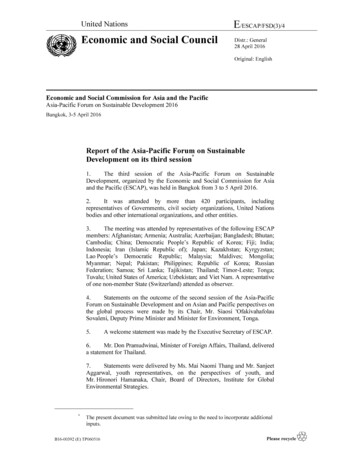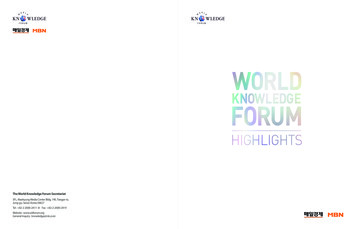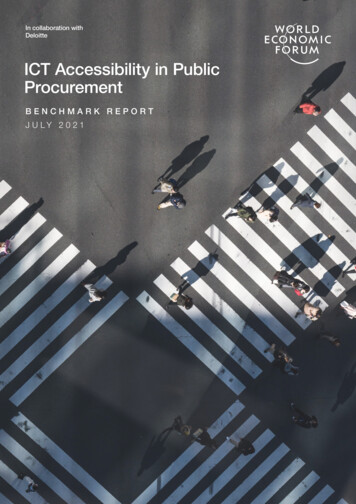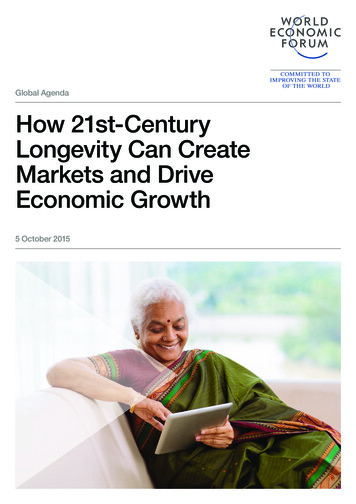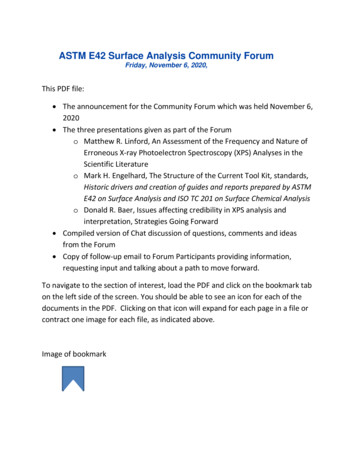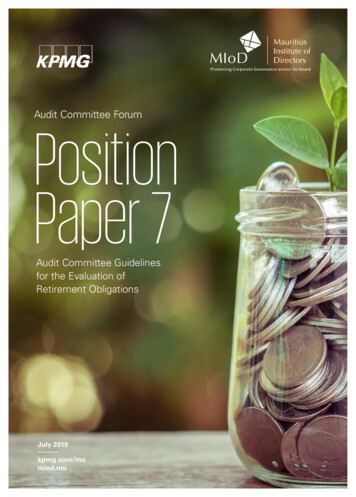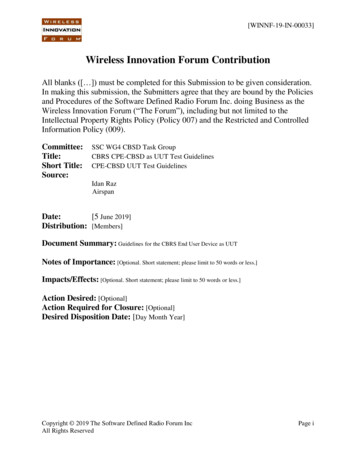
Transcription
BriefingJanuary 2016The World Economic ForumInfluential and controversialSUMMARYThe World Economic Forum is considered to have significant influence. At the sametime, it attracts considerable criticism. To its proponents, the organisation – throughits meetings – enables business, NGOs and political leaders to meet and debatepossible solutions to key issues of global concern. To its critics, the Forum, andspecifically its annual meetings, is nothing more than an opaque venue for political andbusiness leaders to take decisions without having to account to their electorate orshareholders. Nevertheless, its longevity and the high profile of those attending itsevents, make it an organisation that is well known and widely referenced.This year, the Forum's Annual Meeting – with the theme 'Mastering the FourthIndustrial Revolution: how to adapt to the transformation of production, distributionand consumption systems, caused by mobile internet, smaller, cheaper and morepowerful sensors, as well as artificial intelligence and machine learning' – will beco-chaired by six personalities from varying backgrounds, and attended by over2 500 participants, including several European Commissioners.In this briefing: The World Economic Forum (WEF) This year's agenda – theme andmajor issues Criticism – legitimacy issues raised The WEF and the EU Main referencesEPRS European Parliamentary Research ServiceAuthor: Angelos DelivoriasMembers' Research ServicePE 573.928EN
EPRSThe World Economic ForumThe World Economic Forum (WEF)What is the World Economic Forum?On 20-23 January 2016, over 2 500 participants from business, government,international organisations, civil society, academia, media and the arts will gather forthe 46th Annual Meeting of the World Economic Forum in Davos-Klosters (Switzerland).According to its website, the World Economic Forum is an international foundation forpublic-private cooperation which 'aims to engage the political, business and otherleaders of society to shape global, regional and industry agendas'. In contrast tointergovernmental efforts, such as the UN, the IMF or the G7/G8, the Forum began as aprivate initiative; it was established in Geneva, Switzerland, as a non-profit foundation.It claims to be independent, impartial and not tied to any special interests.The organisation – initially, 'European Management Forum' – and its first symposiumwere both launched in 1971, at a turbulent time, both geopolitically (conflicts inVietnam and the Middle East) and economically (the end of the Bretton Woodsinternational monetary system). Its initial aims were (i) to allow top managers ofcorporations to interact with a wider base of stakeholders, and (ii) to provide anopportunity for senior European managers to learn about the latest managementtechniques and concepts from US business leaders and top business school professors.Soon the organisation started inviting people from outside the business world, 1 in anattempt to become a platform 'for provocative yet vital voices'. Its most publicisedevent, the annual meeting, grew fivefold, from 450 members of western European firmsand 50 western European academics and media representatives in 1971, to more than2 000 global participants representing business, government, internationalorganizations, academia and civil society, as well as 480 media2 from around30 countries in 2014. Among others, it counts the following as successes: a meeting of Trade Ministers in 1982 that led to the launch of the Uruguay round in1986 and the creation of the World Trade Organization in 1995; the Davos declaration, signed in 1988 by the Greek and Turkish Prime Ministers – anagreement to reduce tensions that had threatened to cause a war between the twoNATO member states; the joint appearance of Nelson Mandela, anti-apartheid leader and head of theAfrican National Congress (ANC), with President F W de Klerk and Chief Minister ofKwaZulu, Mangosuthu Buthelezi, for the first time together outside South Africa.Composition of the WEFThe board, committees and the staffThe Forum is governed by the Foundation Board, a council of 25 representatives thatdetermine and supervise the activities of the Forum and its bodies including approvingthe annual accounts and strategic direction and manage its statutes. Board membersserve three-year terms and are chosen by the other members of the board from amongleaders in business, politics, multilateral business organisations, academia and civilsociety, and reflect a considerable measure of geographical distribution by organisationand nationality.3 In 2015, in accordance with the World Economic Forum's new status asan international institution, the Foundation Board was established as a board oftrustees, which met for the first time on 26-27 August 2015.Members' Research ServicePage 2 of 8
EPRSThe World Economic ForumTwo committees facilitate the work of the Board: the managing board, composed ofseven people, which acts as the executive body of the Foundation and its representativeto outside parties; and the audit committee, which remains in close contact with theauditors and the Forum's Chief Financial Officer.The executive committee comprises 37 people from senior management and meetsmonthly to discuss key institutional issues. Finally, the Forum has a permanent staffnumbering 464 permanent employees and 29 part-time employees. As well as these,the Forum has representative offices in the USA, in China and in Japan; the total numberof people employed exceeds 500.Forum MembersThe Forum is organised in Communities; those communities translate into varyingdegrees of participation in the Forum and its services and, accordingly, involve differentmembership fees (see 'Financial situation' below).The 100 most engaged member companies supporting the mission of the Forum are theStrategic Partners. They pay the highest membership fees, and participate in bothregional and global events, industry-related activities, public-private partnershipinitiatives, Forum communities and specific insight-developing projects.The next category of member can enter one of four types of partnership 'GlobalChallenge', which allows participation in one or more of the nine global challengeinitiatives (see 'Forum Centres' below); 'Regional', active in Africa, east and south Asia,Eurasia, Europe, Japan, Latin America, and the Middle East and north Africa); 'Industry'(470 companies in 2015); or 'Community' – companies who work with other Forumcommunities, such as the Technology Pioneers, the Global Shapers or the SchwabFoundation for Social Entrepreneurship – according to their interest and engagementlevel.Finally, the Forum's member companies comprising 1 000 of the world's topcorporations, global enterprises usually with more than US 5 billion in turnover takepart in specific activities and assist the Forum.Forum CommunitiesAccording to Christina Garsten and Adrienne Sörbom, the existence of a network ofgroups, partnerships and communities in the context of the Forum, significantly extendsits reach, allowing it to reach across organisational boundaries. Those communities arethe following: The Community of Global Growth Companies engages over 390 companies frommore than 65 countries 'at the forefront of dynamic growth, innovation andsustainability, and which support the Forum's mission of improving the state of theworld'. They are thought by the Forum to have the ambition and capacity to betomorrow's industry leaders and a driving force of economic and social change. The 49-strong Technology Pioneers community develops and applies technologicalinnovation to transform business and society. Technology Pioneers are companies inthe early stages of development, often venture-capital-backed, that have developedor are applying an innovative technology which might have significant impact onbusiness and society (such as diagnostics and health treatment; computing; or visual,audio and sensor technologies).Members' Research ServicePage 3 of 8
EPRSThe World Economic Forum The Young Global Leaders is an enterprising community – set up as a non-profitfoundation – of 950 people from 102 countries, who, in the context of a six-yearprogramme, are fully involved in the Forum's meetings, initiatives and research, andinteract with the Forum's wider multi-stakeholder community. the Global Shapers Community is a global network of hubs present in nearly450 cities in 169 countries, developed and led by over 5 300 young people between20 and 29 years of age, who are 'exceptional in their potential, their achievementand their drive to make a contribution to their communities'.Forum CentresIn 2014-2015, the Forum developed three centres 'designed to shape the global,regional and industry agendas': the Centre for the Global Agenda which focuses onnine 'Global challenge initiatives';4 the Centre for Global Industries which focuses ongathering the most influential industry stakeholders in networks, 'to systematicallyshape industry priorities and agendas'; and the Centre for Regional Strategies, which'aligns regional meetings with the nine Global Challenge initiatives and the activities ofthe Centre for Global Industries'.5Forum networks and programmesThe network of Global Agenda Councils unites the world's top experts from academia,business, government and civil society in a process to better understand and addressglobal challenges. Launched in 2008, the network brings together over 1 500 leadingexperts from around the globe in some 79 councils, to tackle the major issues on theglobal, regional and industry agendas.To support the World Economic Forum in promoting and facilitating public-privatecooperation, the Global Leadership Fellows programme aims to develop leaders whohave the skills and experience to manage multi-stakeholder initiatives.The Schwab FoundationThe aim of the Schwab Foundation, named after the founder of the WEF, Klaus Schwab,is to identify social entrepreneurs, to provide them with platforms to highlight andadvance leading models of sustainable social innovation, and engage them in shapingagendas that improve the state of the world – in close collaboration with the otherstakeholders of the World Economic Forum.Forum annual meetingsThe Forum has three main, recurring, meetings: the annual meeting which takes placein Davos in January, the meeting of the New Champions, a summer meeting organisedin Asia, and the summit on the Global Agenda, which is organised in the United ArabEmirates.The most recent annual meeting convened in Davos-Klosters, on 21-24 January 2015and brought together more than 2 500 participants from over 140 countries. Themeeting marked a milestone for the World Economic Forum as the occasion for thesigning of a Headquarters Agreement with the Federal Council of Switzerland, whichresulted in the Federal Council officially recognising the World Economic Forum as anInternational Institution for Public-Private Cooperation.The latest meeting of the New Champions was held in Dalian (China) on9-11 September 2015, and engaged more than 1 700 participants from 90 countriesunder the theme 'Charting a New Course for Growth'.Members' Research ServicePage 4 of 8
EPRSThe World Economic ForumLastly, the summit on the Global Agenda 2015 convened in Abu Dhabi on25-27 October, and brought together over 1 000 members of 88 World Economic ForumGlobal Agenda Councils from more than 80 countries. Issues on the agenda were,among others: migration; growth and inclusion; and sustainable development goals.Forum publicationsThe World Economic Forum publishes a comprehensive series of reports which examinein detail the broad range of global issues it seeks to address with stakeholders as part ofits mission of improving the state of the world. The Forum's signature product is theGlobal Competitiveness Report. Other standalone publications include the Global RisksReport and the Global Gender Gap Report. Besides those publications, the Forumproduces landmark titles covering the environment, education, individual industries andtechnologies. According to Geoffrey Allen Pigman, member of the Faculty in PoliticalEconomy at Bennington College (Vermont, USA) and author of the book 'WorldEconomic Forum: A Multi-Stakeholder Approach to Global Governance', those reportspresent various aspects of competitiveness 'that are neoliberal and economistic', as wellas issues that focus more on 'the social and cultural consequences of economic growth'.The Forum's financial situationThe Forum's original primary source of revenue was the fees charged to attendees ofthe annual meeting in Davos. This has changed today, the primary revenue source beingmembership fees, which range between CHF 50 000 (membership fees) andCHF 600 000 (strategic partnership fees), while participation fees for the annualmeetings and the regional meetings, as well as fees for the sale of the Forum's researchproducts (such as the Global Competitiveness Report) constitute a secondary source.For the years 2011 to 2015, revenue increased steadily from CHF157.6 toCHF205.8 million. Similarly, expenses (almost equally split between staff expenses andcosts related to 'office and activity' rose from CHF156.4 to CHF205 million. Thedifference each time was added to the foundation's capital. In fact, from the Forum'sfoundation in 1973 until 2014 – with one exception in 19916 – the Forum has generateda financial surplus and kept a positive capital account.This year's agenda – theme and major issuesThe 2016 annual meetingThe theme of the meeting is 'Mastering the Fourth Industrial Revolution' how to adaptto the transformation of production, distribution and consumption systems, caused bymobile internet, smaller, cheaper and more powerful sensors, as well as artificialintelligence and machine learning. The other two 'pillars' of the meeting are addressingglobal security issues revolving around the recent refugee crisis and terrorist acts, andtheir implications and solving problems of the global commons which will deal withenvironmental and social sustainability, financial system reform and internet openness.The meeting will be co-chaired by Mary Barra, CEO of General Motors, Sharan Burrow,General Secretary of the International Trade Union Confederation, Satya Nadella, CEOof Microsoft, Hiroaki Nakanishi, Chair and CEO of Hitachi, Tidjane Thiam, CEO of CreditSuisse and Amira Yahyaoui, Chair of Al Bawsala.The participants will discuss various issues which relate, among other things, to: agriculture and food security – how to revamp the global food system to sustainablydeliver 70% more food than is consumed today, to feed 9 billion people by 2050;Members' Research ServicePage 5 of 8
EPRSThe World Economic Forum economic growth and social inclusion – how the public and private sectors canimprove long-term competitiveness while providing broad-based progress in livingstandards; employment, skills and human capital – how to create 470 million new jobs by 2030if technology is expected to fundamentally disrupt the nature of work itself; environment and natural resource security – how to scale up public-privatecollaboration, new business models and technological innovations that drive climateaction more rapidly; the future of the global financial system – how to introduce initiatives inmacroprudential regulatory policy and innovations in financial services technologythat can deliver sustained economic growth and social development; the future of health – how public and private stakeholders can collaborate to deliverhealthy lives and health security for 9.7 billion people by 2050; the future of the internet – how to ensure that the internet benefits all humankindthrough better global collaboration; gender parity – how to close the gender gap in economic participation, at nearly 50%globally today, in this decade; international trade and investment – how to implement high-priority reforms thatwill improve global commerce and expand global value chains through public-privatecollaboration; and long-term investing, infrastructure and development – how to close the annualUS 1 trillion infrastructure investment gap by introducing viable financing structuresand appropriate risk-assessment frameworks.Criticism – legitimacy issues raisedForum activities have brought not only praise but also a good deal of criticism. Indeed,while participants at the Annual Event tend to tone down its importance (George Sorosis known to have described it as a 'big cocktail party') the Forum's influence in shapingglobal economic policy generally, and in facilitating the spread of neoliberal ideas morespecifically, has attracted criticism from civil society organisations.7Geoffrey Allen Pigman is of the view that critics of the World Economic Forum can bebroadly divided into two levels: those who criticise it at an instrumental level, arguingthat the Forum is not doing what it intends to do as well as it might or ought to do, andthose who question the Forum at an existential level – its mission, its membership, andits methods of operation.Critics of the first category are sympathetic to the broad aims and objectives of theforum, (indeed, according to Pigman, some of them are currently members of theForum) and often tend to be involved with the Forum itself. Their criticisms are morefocused on the Forum's size and content, as well as issues related to management styleand effectiveness.The second category is composed predominantly of segments of global civil society thatcriticise globalisation and tend to view the Forum as an instrument of that worldview,through the discourse that it constructs and drives. According to Pigman, their criticismsare voiced along the following lines: that the Forum's agenda and discourse areMembers' Research ServicePage 6 of 8
EPRSThe World Economic Foruminherently neoliberal and that this benefits the Forum's corporate members at theexpense of the rest of society; that the Forum's public debates and projects conceal itsprivate functions as a network providing business leaders access to policy-makers, andas a private venue for business deal-making; and lastly, that core elements of theForum's activities, such as its not-for-profit status, are more ambiguous than theyappear and thus raise serious ethical questions that need to be addressed.According to Jean-Christophe Graz, key features of the World Economic Forum, such asthe absence of formal delegation of authority to participants, highlighting the deficit intheir legitimacy, favours the development of social forces that contest the existence ofthose transnational elite groups. In the case of the World Economic Forum, these forcesgave impetus to the creation of a 'counter-institution' in the shape of the World SocialForum (WSF) – a parallel gathering of civil society organisations, designed to promotesocial, rather than economic, development. According to Pigman, the World SocialForum, which developed as a rival event in the first years of this century, 'brought hometo the WEF that they . needed to take a more proactive approach to broadeningparticipation of civil society organizations and other stakeholders across global civilsociety'. To adapt to this reality, the WEF increased its invitations to civil societyorganisations (such as Amnesty International) to participate in the annual meeting, aswell as in other Forum meetings and, as of 2003, began co-hosting the Davos 'OpenForum', which features debates on major social, political and economic topics beingdiscussed by delegates to the Annual Meeting and is open to the public.The WEF and the EUThe Forum has had, from the beginning, the support of the European Commission: in1971, two Commissioners, Raymond Barre (Economic and Financial Affairs) andAltiero Spinelli (Industrial Affairs and Trade) were appointed to serve as interlocutorsfor the Forum. This year, the Commission will be represented at the 2016 annualmeeting of the World Economic Forum in Davos by several Members of the College,8who will use the Forum, to set out and promote the EU's priorities and strategies, suchas enhancing investment, growth and jobs; climate action; Energy Union; the DigitalSingle Market; Capital Markets Union; research and innovation; and the management ofthe refugee crisis.Similarly, the European Parliament has been relatively consistently represented at theannual meeting by its President. In the past decade alone, European ParliamentPresidents Pat Cox, Josep Borrell Fontelles, Hans-Gert Pöttering, Jerzy Buzek andMartin Schulz have participated in the Forum, which provided them with an opportunityto discuss pressing issues with heads of state or government, and heads of internationalorganisations.9 In 2015, topics included sustainable development and the crisis inUkraine.Main referencesThe blog of the World Economic Forum (which includes the annual report 2014-2015, and theglobal competitiveness report 2014-2015).The World Social Forum and the Global Economic Symposium websites.Christina Garsten, Adrienne Sörbom 'Think tanks as policy brokers in partially organized fields:The case of World Economic Forum', Stockholm Centre for Organizational Research, 2014.Geoffrey Allen Pigman 'The World Economic Forum: a multi-stakeholder approach to globalgovernance', Routledge, 2007.Members' Research ServicePage 7 of 8
EPRSThe World Economic ForumJean-Christophe Graz 'Qui gouverne ? Le Forum de Davos et le pouvoir informel des clubsd'élites transnationales', ‘A contrario’ 2003/2Agnès Tachin 'Le Forum économique mondial et les médias : une relation singulière entrecoopération et intégration', ‘Le Temps des médias’ 2015/2The Guardian 'Davos – a complete guide to the World Economic Forum', 21 January 2015Financial Times 'Sky-high Davos summit fees leave multinationals feeling deflated', 9 October2014European Commission Press Release 'Wednesday 20-Saturday 23 January: College Membersparticipate in World Economic Forum in Davos', January 2015.Endnotes1Such as Dom Hélder Câmara, the Roman Catholic Archbishop of Olinda and Recife (Brazil) or Captain JacquesYves Cousteau, the renowned French undersea explorer.2It should be noted here that, as the participants changed from west European to global, so did the mediacapturing the event: in 2014, almost one quarter of the 480 journalists covering the annual meeting were from theUS, while west European media together (predominantly British, Swiss, German and French) amounted only to42% (see A. Tachin).3Current board members include the Chairman of Nestlé, Peter Brabeck-Letmathe, H.M. Queen Rania of Jordan,the Chair of the Financial Stability Board and Governor of the Bank of England, Mark Carney, and the ManagingDirector of the IMF, Christine Lagarde.4In the areas of agriculture and food security, economic growth and social inclusion, employment skills and humancapital, environment and resource security, the future of the global financial system, the future of the Internet,global gender parity, international trade and investment, long-term investing, and infrastructure anddevelopment.5An example of the Centre’s impact is the 'Grow Asia' initiative, which aims to improve the livelihoods of 20 millionsmallholder farmers by 2020 and increase their productivity, profitability and environmental sustainability by 20%.6This, according to Geoffrey Allen Pigman was due to investing in an – eventually – unsuccessful communicationtechnology initiative.7In this respect, Jean-Christophe Graz notes that the French monthly Le Monde Diplomatique 'has described theWorld Economic Forum as 'the meeting place of the masters of the world ., the capital of globalisation, and themain home of the 'pensée unique'.'8In January 2016, Frans Timmermans, Federica Mogherini, Andrus Ansip, Maroš Šefčovič, Jyrki Katainen, GüntherOettinger, Johannes Hahn, Cecilia Malmström, Vytenis Andriukaitis, Pierre Moscovici, Jonathan Hill and CarlosMoedas are all due to participate in the World Economic Forum's annual meeting.9Such as the Secretary-General of the United Nations.Disclaimer and CopyrightThe content of this document is the sole responsibility of the author and any opinions expressed thereindo not necessarily represent the official position of the European Parliament. It is addressed to theMembers and staff of the EP for their parliamentary work. Reproduction and translation for noncommercial purposes are authorised, provided the source is acknowledged and the European Parliament isgiven prior notice and sent a copy. European Union, 2016.Photo credits: gustavofrazao / nion.eu (intranet)http://www.europarl.europa.eu/thinktank (internet)http://epthinktank.eu (blog)Members' Research ServicePage 8 of 8
global, regional and industry agendas. To support the World Economic Forum in promoting and facilitating public-private cooperation, the Global Leadership Fellows programme aims to develop leaders who have the skills and experience to manage multi-stakeholder initiatives. The Schwab Foundation



